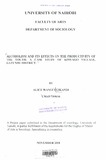| dc.description.abstract | The intensity of alcohol abuse in Kenya has been a major concern in recent years, more
so affecting the youth. This study focused on the youth aged between ages 15-25 years
and was carried out in Kinyago Village, Gatundu District, where the problem of youth
alcoholism was noted as highly prevalent. The study set out to find out the extent to
which alcoholism affects productivity of the youth, and to understand how the youth cope
with the challenges of alcoholism in Kinyago village, Gatundu District.
The objectives of the study were: 1); to identify the coping mechanisms adopted by the
addicts of alcoholism as well as the significant others, 2) to assess the attitudes and
perceptions of the community towards the problem of youth alcoholism, and 3) to
establish the mitigation measures put in place to deal with the problem of alcoholism
among the Kenyan youth at the community and national levels.
To achieve the stated objectives, a survey research was carried out. Probability and non-probability
sampling was used to gather a total of 128 respondents. A structured
questionnaire was used to collect data from the youth and an unstructured interviews
collected data from the key informants. The raw data collected were processed using the
SPSS statistical package; both descriptive and inferential statistics were used to analyze
the data. Findings from the study revealed that 90% of the youth were men. The education level of
the youth was low with only 33% having completed secondary education. The type of
alcohol consumed in this village is chang'aa and 88% of the youth said that it is of poor
quality. The youth admitted that they drink excessively. The study found diverse ways in
which the youth cope with the drinking problem which includes; fighting their spouses
and parents, avoiding those who discourage them from drinking, stealing from spouses
and other family members, while others sink deep into denial. The findings here revealed
that 79% of the youth drink due to unemployment and not peer pressure as other studies
have indicated. 97% admitted that alcoholism has affected their productivity a lot. There
are some mitigation measures put in .place to deal with the problem of alcoholism among
the Kenyan youth both at the community and" national levels. These include; the police
raid the chang'aa dens, the parents talk to their youth, discourage them from drinking and
pressurize them on the same, introduction of the youth funds to keep youth busy in
business, chiefs hold public barazas to address the youth on the negative effects of
alcoholism, games are also organized to occupy the youth and church leaders hold
crusades and seminars as a forum to discourage youth from drinking. However 90% of
the youth were of the opinion that the measures put up were not appropriate or effective
in addressing the problem of youth alcoholism. The stakeholder therefore need to intensify their efforts in addressing the problem of
youth alcoholism to save the youth from this menace otherwise our future leaders are
really in peril. The youth felt that everything should be done to discourage them from
drinking and alternative occupation/employment made available. The government should create employment or find ways of occupying the youth, and enact effective laws to
contain the sale of chang' aa. The youth should also raise education level, boost business
development skills, and avoid HIV/AIDS. The teachers teach on the dangers of
alcoholism, become good role models
Future studies should address the role of parents in molding an alcohol free youth, effects
of alcohol related activities on poverty levels in the society, and the social-economic
effects of alcoholism on the family stability. | en |

